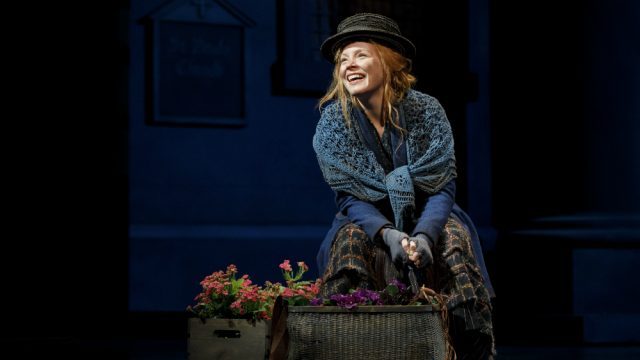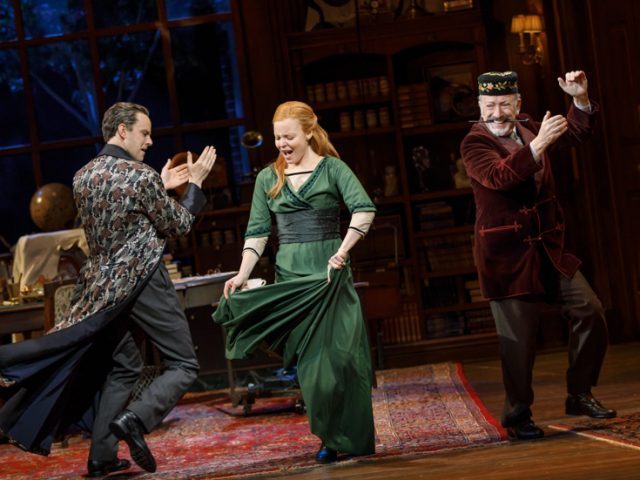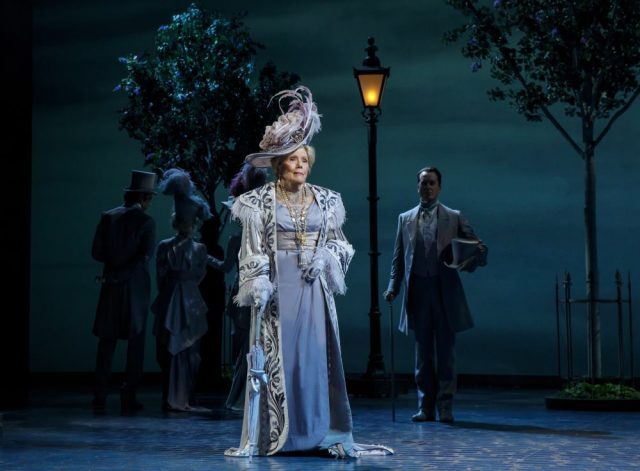
Lauren Ambrose excels in iconic role of Eliza Doolittle in Lincoln Center revival of My Fair Lady (photo by Joan Marcus)
Vivian Beaumont Theater at Lincoln Center Theater
150 West 65th St. between Broadway & Amsterdam Ave.
Tuesday – Saturday through January 6, $97-$199
212-362-7600
www.lct.org
Revivals don’t get much better than Bartlett Sher’s absolutely loverly version of My Fair Lady at Lincoln Center’s Vivian Beaumont Theater. Sher, who previously helmed widely acclaimed productions of South Pacific and The King and I at Lincoln Center, has created an inspiring My Fair Lady for the twenty-first century, honoring the original while bringing the female-empowerment aspect of the story to the fore. The musical adaptation of (George) Bernard Shaw’s Pygmalion, itself inspired by Ovid’s Metamorphoses, had thwarted Rodgers and Hammerstein as well as Frank Loesser, Irving Berlin, and Cole Porter until Alan Jay Lerner and Frederick Loewe reunited after a brief separation and took on the tale. Outside the Royal Opera House in Covent Garden in 1912, Cockney flower girl Eliza Doolittle (Lauren Ambrose) is selling violets. Dirty and shabbily dressed, she is nearly knocked over by the fashionable Freddy Eynsford-Hill (Jordan Donica), and her flood of Cockney outrage earns her a harangue from Professor Henry Higgins (Harry Hadden-Paton), a linguistics expert who is so offended by the way she talks that he declares, “A woman who utters such depressing and disgusting sounds has no right to be anywhere — no right to live. . . . Your native language is the language of Shakespeare and Milton and the Bible; don’t sit there crooning like a bilious pigeon.” The next day, Eliza arrives at Higgins’s fancy Wimpole St. home, demanding vocal lessons to make her “more genteel.” Higgins, who has been joined by Col. Pickering (Allan Corduner), treats Eliza harshly, referring to her as “baggage,” but when Pickering offers to pay for her lessons as part of a bet that Higgins can turn her into a lady in time for the Embassy Ball in six months, the professor agrees to take her on. “She’s so deliciously low — so horribly dirty!” Higgins proclaims right in front of her. “I’ll make a duchess of this draggle-tailed guttersnipe!”

Professor Henry Higgins (Harry Hadden-Paton) and Col. Pickering (Allan Corduner) celebrate with Eliza Doolittle (Lauren Ambrose) in My Fair Lady at the Vivian Beaumont (photo by Joan Marcus)
It seems like an impossible task for Higgins, a misogynist of the first order. “I’m an ordinary man; / who desires nothing more / than just the ordinary chance / to live exactly as he likes / and do precisely what he wants,” he sings. “But let a woman in your life / and you are plunging in a knife! / Let the others of my sex / tie the knot — around their necks; / I’d prefer a new edition / of the Spanish Inquisition / than to ever let a woman in my life!” Before she is making any real progress, her drunkard of a father, Alfred P. Doolittle (Norbert Leo Butz), shows up at Higgins’s home, asking for money in exchange for Eliza, assuming there is something more than just speech lessons going on. “Have you no morals, man?” Pickering asks. “No, I can’t afford ’em, Governor. Neither could you if you was as poor as me,” Doolittle replies. They eventually come to an agreement, and Higgins gets back to work preparing Eliza for proper society. From the horse races at Ascot to the Embassy Ball and beyond, the relationship between Eliza and Henry further develops, taking both of them by surprise, especially the professor, who loses control over his creation. Meanwhile, Freddy begins courting Eliza, Alfred wants more money, and Higgins’s elegant mother (Diana Rigg) finds the whole thing rather funny.

Diana Rigg has earned her fourth Tony nomination (winning one) for playing Mrs. Higgins in Bartlett Sher’s outstanding production (photo by Joan Marcus)
My Fair Lady has featured such Eliza/Henry pairings as Julie Andrews and Rex Harrison (the 1956 Broadway original, directed by Moss Hart), Audrey Hepburn and Harrison (the 1964 film, which won eight Oscars), Christine Andreas and Ian Richardson (1978), Melissa Errico and Richard Chamberlain (1993), Martine McCutcheon and Jonathan Pryce (2001), and Errico and John Lithgow (2003), the difference in age between the man and the woman generally being twenty-five years or more. However, Ambrose (Six Feet Under, Exit the King) is actually three years older than Hadden-Paton (The Importance of Being Earnest, Downton Abbey), so Sher has them on more equal footing from the very start. Ambrose plays Eliza as a strong-willed, self-protective, astute woman who is determined to better herself, but on her own terms. Meanwhile, Hadden-Paton’s Henry has cracks in his armor that show up early, particularly as Eliza gains pride and power, right up through the gripping finale. Corduner is superb as the eminently likable Pickering (Titanic, Taken at Midnight), while Tony and Emmy winner Rigg (Medea, The Avengers) nearly steals the show as Mrs. Higgins, looking ever-so-chic in Catherine Zuber’s elaborate gowns and Tom Watson’s sophisticated coiffures. (How often does an actress who doesn’t sing a word get nominated for a Tony in a musical?)
Tony-winning choreographer Christopher Gattelli and Tony-winning music director Ted Sperling, who both collaborated on Sher’s South Pacific and The King and I, do fabulous jobs here too, particularly in the “Ascot Gavotte” and “Embassy Waltz” scenes but also during wonderful interpretations of “With a Little Bit of Luck,” “You Did It,” “Get Me to the Church on Time,” and “The Rain in Spain.” Michael Yeargan’s dramatic sets further the class division prevalent in 1912 London as well as today. Higgins’s ornate yet refined home slides toward the audience from backstage, revolving from the elegant study to the front hall to the bath and other rooms. When Wimpole St. recedes backstage, the ensemble wheels in rickety DIY-style fences, light poles, and storefront facades. In 1908, Oscar Straus adapted Shaw’s Arms and the Man into The Chocolate Soldier; in 1939, when Shaw was asked about letting Kurt Weill adapt The Devil’s Disciple, he responded, “Nothing will ever induce me to allow any other play of mine to be degraded into an operetta or set to any music except its own.” Shaw died in 1950 at the age of ninety-four; My Fair Lady, with book and lyrics by Lerner and music by Loewe, premiered six years later. We’ll never know what Shaw would have thought of it, but the rest of us can now delight in Sher’s magical 2018 production, which is a smashing success, a classic musical with a fresh, bright take on class and gender issues that is just right for these crazy times.